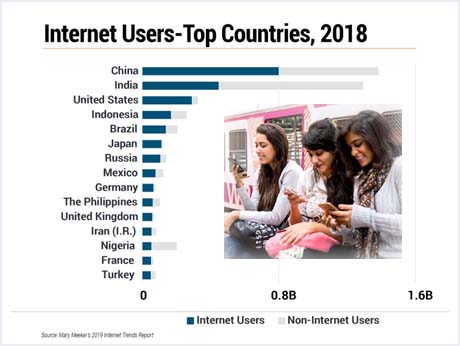
June 13 20129: Bond Capital founder and former Kleiner Perkins general partner Mary Meeker is back with her annual survey: The Internet Trends report. According to the 2019 report presented at Vox/Recode’s Code Conference in Scottsdale, Ariz. on June 11, Tuesday, India has the world’s second-largest internet user base, with nearly 12 percent of the world's 3.8 billion population using the internet globally belong to India, behind 21 percent in China and ahead of the U.S with an 8 percent contribution.
The report cited the role played by Reliance Jio in India's Internet numbers: the company doubled the number of its users to 307 million in a year, and also saw a doubling in data usage. Relaince Chairman Mukesh Ambani is quoted as saying. "The Jio platform will bring together 350 million customer footfalls at Reliance Retail stores, 307 million Jio connectivity customers & 30 million small merchants all over India who provide the last-mile physical market connectivity."
The global Net population was up from 49 percent (3.6 billion) in 2017.
Other highlights of the report:
- E-commerce is now 15 percent of retail sales. Its growth has slowed — up 12.4 percent in Q1 compared with a year earlier — but still towers over growth in regular retail, which was just 2 percent in Q1.
- Images are increasingly the means by which people communicate, as technology developments like faster wifi and better phone cameras have encouraged a surge in image taking. More than 50 percent of Twitter impressions now involve posts with images, video or other media; Twitter used to be text-only.
- The number of interactive gamers worldwide grew 6 percent to 2.4 billion people last year, as interactive games like Fortnite become the new social media for certain people. The number of people who watch those games — rather than participate — is swelling, too.
- As privacy becomes a bigger selling point, expect more options to make your online communications safe. In Q1, 87 percent of global web traffic was encrypted, up from 53 percent three years ago.
- The internet will become more of a cesspool: Getting rid of problematic content becomes more difficult on a large scale, and the very nature of internet communication allows that content to be amplified much more than before. Some issues: 42 percent of US teens have experienced offensive name-calling online, terrorists are being radicalized on sites like YouTube, and social media has encouraged increased political polarizatio
Mary Meeker first presented a report of this kind, which underlines the most important statistics and technology trends on the internet, in 1995. Read full report deck here. https://www.bondcap.com/report/itr19/#view/1
Valuable companies are mostly in tech
The Mary Meeker report finds that as of last week, seven out of 10 of the world’s most valuable companies by market cap are tech companies, with only Berkshire Hathaway, Visa, and Johnson & Johnson making the Top 10 as non-tech companies: